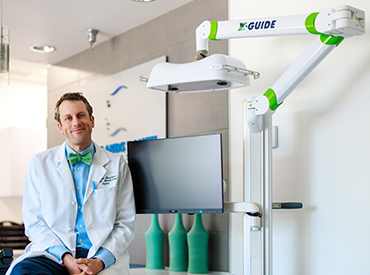 Having missing teeth can often be embarrassing when your smile is one of the first things others notice. In addition, gaps can affect how you speak and the foods you eat, and the longer a tooth is missing, the more impact it can have on your remaining teeth and gums and your facial structure in general. Two common solutions to address missing teeth are dental implants and dental bridges.
Having missing teeth can often be embarrassing when your smile is one of the first things others notice. In addition, gaps can affect how you speak and the foods you eat, and the longer a tooth is missing, the more impact it can have on your remaining teeth and gums and your facial structure in general. Two common solutions to address missing teeth are dental implants and dental bridges.
Both of these procedures have their pros and cons, and both can offer effective results. The decision comes down to your situation and what is best for you. Your doctor can help you understand what is involved and what to expect with each procedure so you can make an informed decision.
What is a Dental Implant?
A dental implant replaces the root of the tooth and has a crown attached to blend in with surrounding teeth. It is a small titanium post or screw that is inserted directly into the jawbone. The bone then fuses with the implant in a process called osseointegration. This process forms an incredibly strong and stable bond that can withstand the force of chewing. A replacement tooth is then affixed to the top using a connector called an abutment.
Pros of Dental Implants
There are numerous benefits to choosing dental implants:
- They may last the rest of your life without being replaced if cared for properly.
- They are cared for just like natural teeth.
- They prevent bone deterioration by stimulating the bone.
- They do not negatively impact surrounding teeth.
- They can help prevent other teeth from shifting by closing the gap.
- They can be more cost-effective than bridges in the long term.
Cons of Dental Implants
There can also be some drawbacks to consider when thinking about dental implants:
- They require surgery to be inserted.
- There is a slight chance of rejection (but dental implants have around a 98% success rate).
- It takes about three months for the dental implant to fuse with the bone, so full function is not immediate following surgery.
What is a Dental Bridge?
A dental bridge also corrects missing teeth, but not by replacing the individual tooth. Instead, a prosthetic is created that spans the gap and attaches to the teeth on either side. The doctor files and reshapes the adjacent teeth so that the bridge fits overtop and makes it appear like a seamless row of teeth. Once the bridge is in place, you can return to eating your regular diet within a few days.
Pros of Dental Bridges
- They do not require any surgery.
- Results are immediate, and there is minimal recovery time.
- They do not rely on having adequate bone mass or density.
- They are typically less expensive upfront than dental implants.
Cons of Dental Bridges
- They need to be replaced every five to 10 years on average.
- They do not prevent bone resorption because they sit on top of the gums.
- The teeth used to hold the bridge in place may become damaged or deteriorate over time.
- They can be more challenging to clean properly compared to dental implants.
How Do Dental Implants and Dental Bridges Compare in Terms of Cost?
The cost of dental implants and dental bridges can vary based on your individual situation. Factors that can affect cost include:
- Number of missing teeth
- Material used for the implant or bridge
- Complexity of the procedure
- Whether any additional procedures are necessary
- Facility or anesthesia fees (for implants)
- Geographic location
- Provider training and experience level
- Insurance coverage
Many dental insurance plans provide at least some coverage for bridges, but they do not typically cover implants. However, while dental bridges may be less expensive up front, they need to be replaced every few years, which can cost more in the long run. Dental implants themselves do not usually need to be replaced, but the crown may need to be.
Your doctor may offer payment plans or financing to help offset the cost of dental implants or dental bridges. Financing can enable you to focus more on which option is a better fit for your goals and lifestyle as opposed to only looking at price.
How Do I Know Which Is the Right Choice for Me?
This is a decision that you will want to make with input and guidance from your doctor. They can give recommendations from a medical standpoint based on your situation and what aligns with your needs. Here are a few more factors to keep in mind:
How Many Teeth Are Missing. Dental implants tend to be most effective for individual teeth or an entire arch (Teeth-in-a-Day). If you have several missing teeth in a row, replacing each one individually may not be the most practical solution. A bridge may be a better option to close this gap.
Treatment Time. Dental implants can be a highly effective long-term solution, but it takes time for the implant to fuse before the replacement tooth can be attached. Therefore, a temporary crown will be used in the meantime. On the other hand, dental bridges offer a more immediate fix, but they do not last as long.
Your Health. You will want to discuss any medical conditions you have with your doctor so they can determine if you are a good candidate for dental implant surgery. For example, let your dentist or oral surgeon know if you smoke, have diabetes, or have other health concerns that may affect recovery. Dental bridges offer a non-surgical option for those who do not qualify for surgery.
Get Help Deciding What is Right for You
Both dental implants and bridges are designed to restore function and blend in with existing teeth. If you are ready to replace missing teeth but are unsure which option is right for you, talk to the team at Highlands Ranch Oral & Facial Surgery or a provider near you.




